Fiction
Fiction

THEY LIED TO YOU ABOUT THE EUNUCHS
This book project introduces the history of eunuchism through auto-theory, historiography, historical fiction and poetry, exploring this identity in the ancient world and what kind of echoes can be heard in the present day. By overlapping various histories, and drawing the line between eunuchs in antiquity and contemporary gender discourse, Odete makes a case for a history of gender that hasn’t yet been written, asking what is the relevance of eunuchs to the history of art? And what does the study of the eunuch expose about the current world?
Edited by Jan-Pieter ‘t Hart
Proofread by Callum Dean
Designed by Tjobo Kho & Vlad Omelianenko

The Obscene Madame D
A wickedly funny work of depraved genius by one of Brazil’s most radical twentieth-century writers; imagine the Marquis de Sade as written by Clarice Lispecter.
An electrifying masterpiece by one of modern Brazilian literature’s most significant and controversial writers, Hilda Hilst takes us into the disorder and beauty of a mind restlessly testing its own limits.
Every month I ingested the body of God, not in the way one swallows green peas or agrostis, or swallows swords, I ingested the body of God the way people do when they know they are swallowing the More, the All, the Incommensurable, for not believing in finitude I would lose myself in absolute infinity…
The Obscene Madame D tells the story of Hillé, a sixty-year-old woman who has decided to abandon conventional life and spend the rest of her days in contemplation in a recess under the stairs. There, she is haunted by the perplexity of her recently deceased lover, Ehud, who cannot understand her rejection of common sense, sex and a simple life in favour of metaphysical speculations that he considers delusional and vain.
In a stream-of-consciousness monologue that’s part James Joyce, part Clarice Lispector, and part de Sade, Hillé speaks of her search for spiritual fulfilment from a space of dereliction, as she searches for answers to great questions of life, death and the relationship between body and soul.
Translated by Nathanaël and Rachel Gontijo Araujo
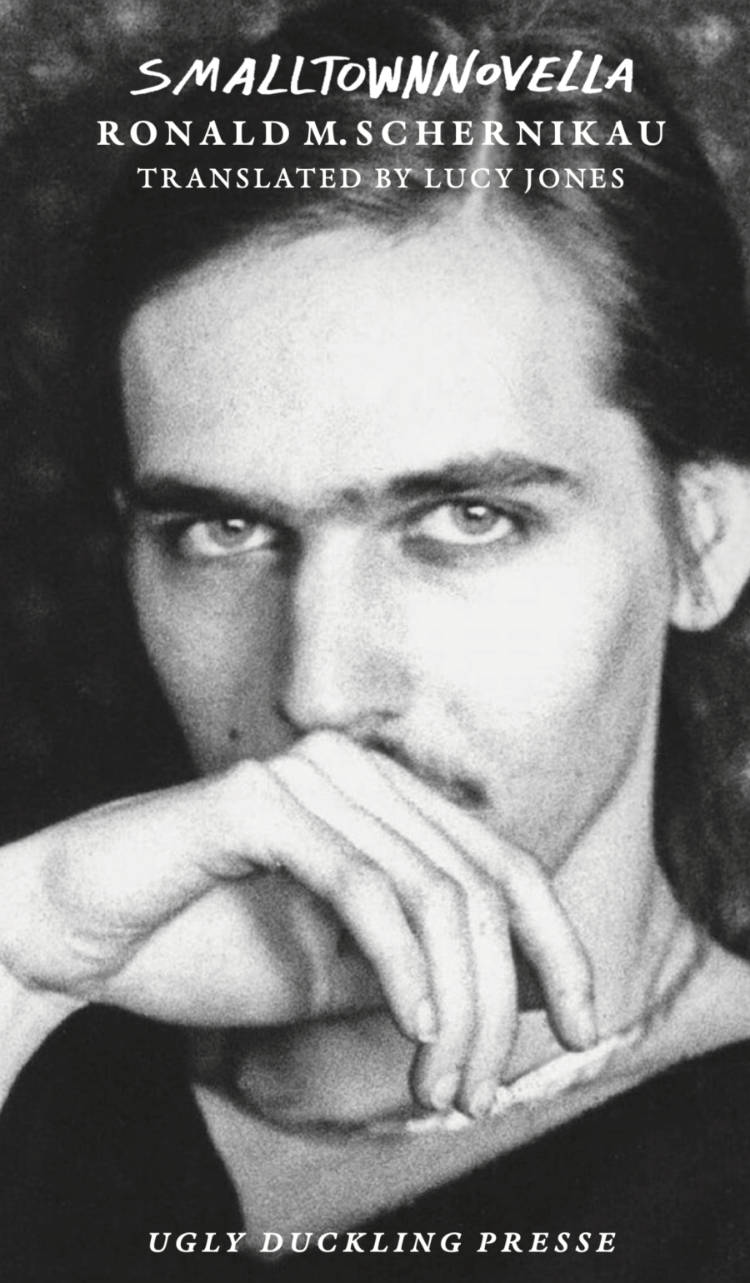
SMALLTOWNNOVELLA
Ronald M. Schernikau, Lucy Jones
An homage and reimagining of the classic German Bildungsroman, Schernikau paid tribute to the form even as he challenged stylistic, sexual, and political conventions. Written in all lower-case, SMALLTOWNNOVELLA is a brilliant stream-of-consciousness narrative that follows b, a teenager navigating politics and queer desire in a small, West German town. When b—who is interested in communism and knitting—falls in love with leif, a popular jock, b’s life at school is very predictably upended.
“A mighty, slender record of the provocative intelligence of a queer teenage mind.” —Eliot Duncan
Ronald M. Schernikau was born in 1960 in Magdeburg, East Germany and grew up in Hanover, West Germany. After completing his Abitur in 1980, he moved to West Berlin and studied German literature, philosophy, and psychology. In 1986, he started studying at the Institut für Literatur Johannes R. Becher (German Institute for Literature) in Leipzig, GDR. In 1989 he obtained GDR citizenship and relocated to Berlin. He worked as a dramaturge, and in radio and TV until his death in 1991. His publications include Kleinstadtnovelle (Small-Town Novella, 1980); Die Tage in L. (The Days in L., 1989); Legende (Legends, 1999); Königin im Dreck (Queen in the Dirt, 2009); and Irene Binz. Die Befragung (Irene Binz. The Interview, 2010).
Lucy Jones is a British translator and writer based in Berlin. She is the translator of Brigitte Reimann’s Siblings, (Penguin Modern Classics), Anke Stelling’s Higher Ground (Scribe) and Annemarie Schwarzenbach’s Lyric Novella (Seagull Books), among others. Her translations and book reviews have appeared in Asymptote, Words Without Borders and CulturMag. She is the runner-up for the Society of Author’s Schlegel-Tieck Prize in 2023.
PRAISE
“This slender book is a fierce account of queer teenage imagination: provocative, haughty, coy, insolent, and wild. As angsty as it is intelligent, Schernikau’s prose also feels protective and sweet. SMALLTOWNNOVELLA is the book, the friend, I wish I had in high school.” —Eliot Duncan
“…an earnest, seemingly offhand account of a brilliant young man growing up in a small town and realizing that his queerness and his communist politics will come to structure his life. (…) the first of Schernikau’s many attempts to lay out a gay politics that would open him to the world rather than fating him to a specific lot within it: an identity politics not constructed to elaborate and defend a single perspective, but one that sought to locate the self within a broader movement to transform society." —Ben Miller & Nicholas Courtman, LARB

Tripwire 15 - Narrative/Prose
Narrative/Prose issue, featuring a special section: I was writing, but it was drawing: a Renee Gladman mini-feature with work by Renee Gladman * Earl Jackson, Jr. * Bruna Mori * Alexis Almeida on Renee Gladman & Julie Carr * Lewis Freedman & Vanessa Thill on Renee Gladman & Mirtha Dermisache. as well as work by Isabel Waidner * sissi tax (translated by Joel Scott & Charlotte Theißen) * Susan Hefuna * Mira Mattar * Lital Khaikin * Maryam Madjidi (translated by Ruth Diver) * Omer Wasim & Saira Sheikh * Ilse Aichinger (translated by Christian Hawkey & Uljana Wolf) * Bronka Nowicka (translated by Katarzyna Szuster) * Maude Pilon (translated by Simon Brown) * Mehmet Dere * Syd Staiti * Jena Osman * Germán Sierra * Natani Notah * Julia Bloch on Bernadette Mayer * Robert Glück on Clarice Lispector * Rob Halpern on Bruce Boone & Dennis Cooper *Dylan Byron on/after Bruce Boone * Linda Bakke on Communal Presence: New Narrative Writing Today * Anna Fidler * Corey Zielinski on Bob Glück & Writers Who Love Too Much: New Narrative 1977-97 * Jackie Kirby on From Our Hearts to Yours: New Narrative as Contemporary Practice * David W. Pritchard on Kevin Killian * Dale Enggass on Simone White * Allison Cardon on Anne Boyer * Robert Balun on Leslie Kaplan * Marco Antonio Huerta on Omar Pimienta * Allison Grimaldi Donahue on Josué Guébo * Sara Florian on Lasana Sekou * Louis Bury on Allison Cobb * Hugo Gibson on Annie Ernaux.

A Map of Absence: An Anthology of Palestinian Writing on the Nakba
A Map of Absence presents the finest poetry and prose by Palestinian writers over the last seventy years. Featuring writers in the diaspora and those living under occupation, these striking entries pay testament to one of the most pivotal events in modern history – the 1948 Nakba.
This unique, landmark anthology includes translated excerpts of works by major authors such as Mahmoud Darwish, Ghassan Kanafani and Fadwa Tuqan alongside those of emerging writers, published here in English for the first time. Depicting the varied aspects of Palestinian life both before and after 1948, their writings highlight the ongoing resonances of the Nakba.
An intimate companion for all lovers of world literature, A Map of Absence reveals the depth and breadth of Palestinian writing.
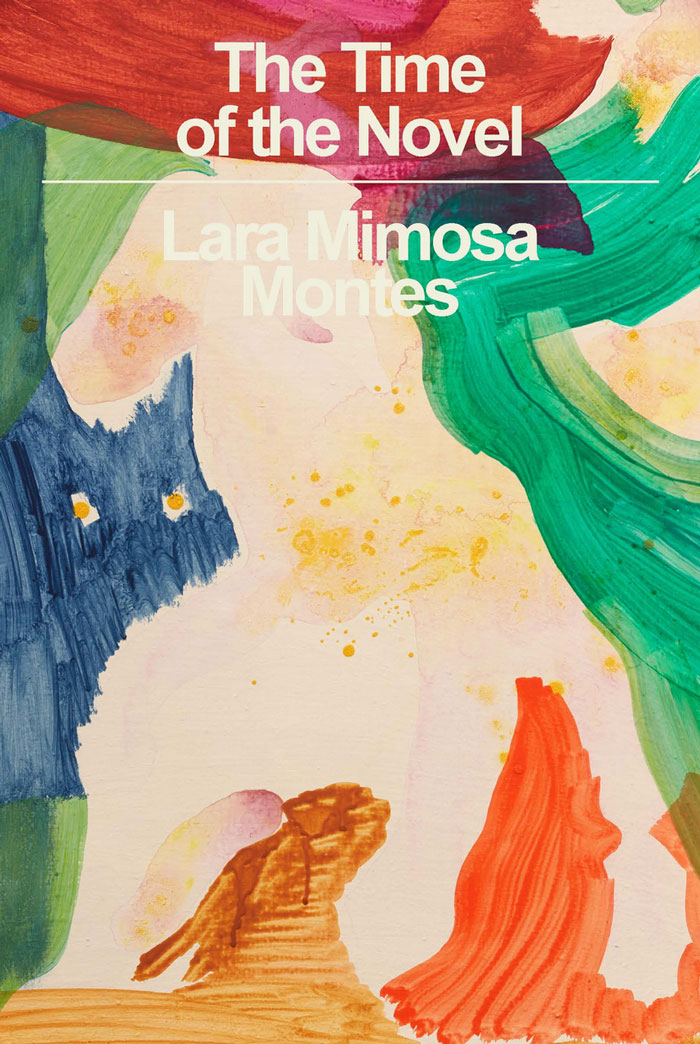
The Time of the Novel
A disaffected young woman seeking self-estrangement and withdrawal from the world decides to quit her day job as a bookseller to live out, or live in, an experiment: to become a full-time narrator. She moves through sentences, afternoons, a rented apartment, an artist’s studio, a party, the post office with the flowering focus of a realist novel, transposing physical and social life to the space of fiction. As she chronicles the process of becoming a subject in writing, the narrator confronts her fantasy of uninterrupted interiority—and its limits.
What is “fiction” and how does one “enter” into it? Composed in the tense of Literature, Lara Mimosa Montes’s The Time of the Novel is a book about detours, psychic swerves, and surprising encounters with the Real as it converges with the written.
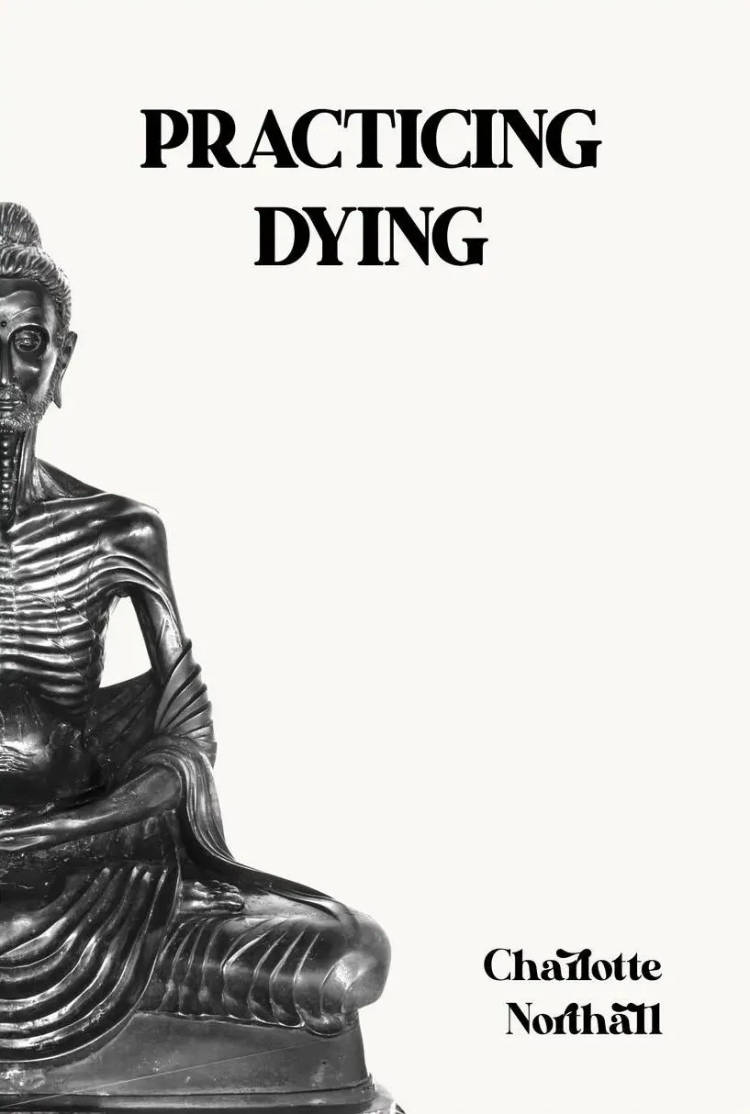
Practicing Dying
Practicing Dying is a literary anti-memoir documenting life in a Zen Buddhist monastery in rural France where the protagonist, a woman in her late twenties, attempts to overcome chronic drug addiction and mental illness.
Broken and severely unwell, our protagonist arrives at the monastery from London: starving, drug-addicted and disillusioned, having exhausted every conventional treatment route available to her. The book examines how, habituated to a life of benefits assessments, petty-crime and sex work, she struggles to adjust to the rules, discipline and religious life of the monastery—at times to devastating and comedic effect.
As the story unfolds, she reflects on her addictions and past experiences, raising critical questions about what it means to be "an addict" and why there may be vested corporate and societal interests in maintaining a narrow, individualistic understanding of addiction.
Anarchic and provocative, tender and self-deprecating, Practicing Dying differs from other contemporary memoirs in the genre of addiction-recovery by simultaneously challenging the dominant narratives surrounding mental health while proposing an alternative approach to treating the “sickness of self” from which we all increasingly suffer.
‘Practicing Dying is brilliant, rewarding and difficult. Northall offers the most brazen and shocking account of addiction I’ve ever read. Committing herself to the practice of Mahayana Buddhism, she eventually finds a way out, but only on the most rambling, circuitious path. Her account of addiction and loss, displacement and grief is profound and it proves that nothing is ever one thing.’ — Chris Kraus, author of The Four Spent The Day Together
Charlotte Northall is a London-based writer. Her debut, Practicing Dying, blends autobiography and cultural criticism to explore addiction, capitalism, and spiritual practice. She works with rough sleepers, supporting those living with addiction and complex mental health needs.
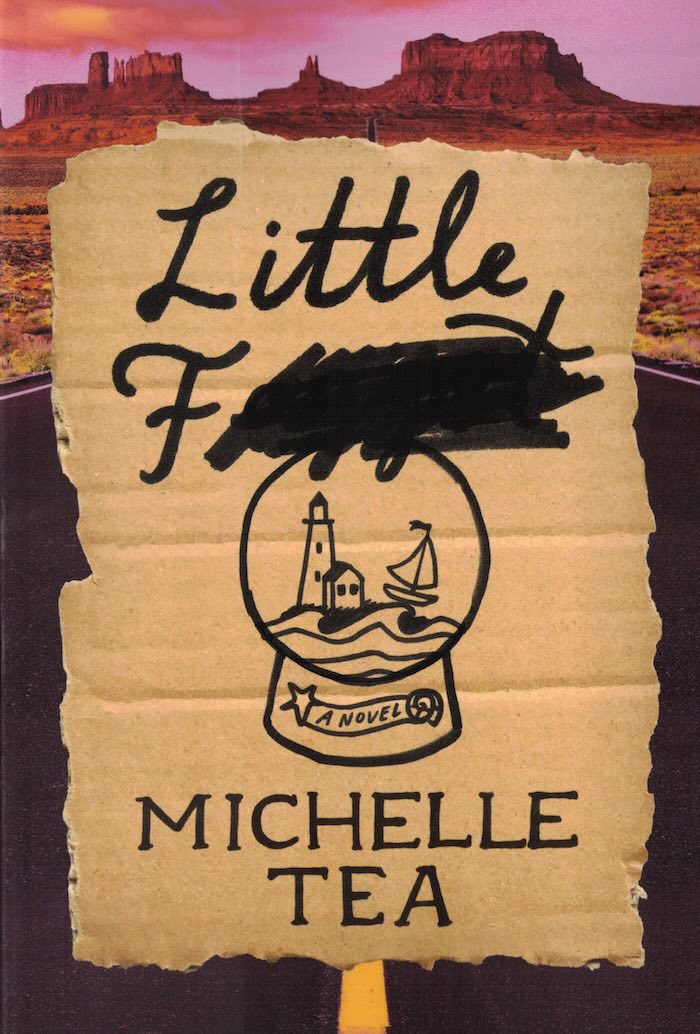
Little F
A new epic novel about a teenage queer runaway from cult classic author of Black Wave and Valencia Michelle Tea. A Literary Hub Notable Small Press Book of 2025.
In Spencer's fantasies, the breezy, queer streets of Provincetown, MA, are utopia, a place where he can be free. Yet when a violent attack in his suburban Arizona schoolyard sends him to the hospital, he decides queer utopia can't wait. And one night, with the help of his best friend, the teenage witch Joy, he hitches a ride to find it.
The cross-country road odyssey that follows brings Spencer from new moon rituals in Arizona canyons to Texas bus stations, from the luxe drag stages of Houston's Montrose district to the jazz-soaked streets of the French Quarter and beyond. This new novel from Michelle Tea tells the story, by turns raw, romantic, and sweet, of a sheltered boy taking his first leap into queer life, among all the complicated queers who live it.
"Tea's conversational tone and her way of writing deeply personal experience . . . presents a very necessary counter-narrative to mainstream histories of American punk, feminism, and sexual identity." – The Brooklyn Rail
Michelle Tea is the author of over twenty books of fiction, memoir, poetry and children's literature. Her autofiction Valencia, a cult classic, won the Lambda Literary Award for Best Fiction. Her essay collection Against Memoir was awarded the PEN/Diamonstein-Spielvogel Award for The Art of the Essay. Tea is also the recipient of awards from the Rona Jaffe Foundation and the Guggenheim Foundation. The founder of Drag Queen Story Hour, she has received honors from the American Library Association and Logo Television. Tea curated the Sister Spit Books series at City Lights Publishers and founded the ongoing imprint Amethyst Edition at the Feminist Press.

Sea, Poison
Cumin Baleen is a forty-one-year-old writer living in Philadelphia—this city of hospitals—who works at the upscale grocery Sea & Poison and is navigating the onset of an autoimmune condition. To start a medication that may help, an eye exam is required and this leads to a nightmarish laser eye surgery. The laser shoots into her brain, making her language spare and her sentences clause-less, a vexing constraint that stalls her book on gynecological malpractice: she wants others, in the realm of our for-profit medical industry that "renders the Hippocratic Oath its opposite," to see poison.
Meanwhile, Cumin is kicked out of her boyfriend Mari's studio after he falls for Janine, their landlord, and starts renting a closet in Maron's bedroom—polyamorous Maron who is hooking up with Alix, whom Cumin lusts after. Disheveled from medicines and medical scams, Cumin declares, "I don't know what to say, I'm saying I have a cracked appearance. It's not a pity party, it's a character sketch. Insofar as you'll need to be looking at me, that your mind should fill me up with its own swaying cognitive and toxic reeds if we are to do this, your imagination should touch me with its ridiculous poison."
Caren Beilin's hypnotic and fractured story is at once an homage to Shusaku Endo's terrifying novel of human vivisection The Sea and Poison and the spirit of OuLipo, the pioneering French writing group that sought new literary potential through constraints.
Caren Beilin was born in Philadelphia in 1983. She is the author of the novel Revenge of the Scapegoat, which won the Vermont Book Award for Fiction. Her other books are Blackfishing the IUD, Spain, The University of Pennsylvania, and Americans, Guests, or Us. She lives in Cleveland and Philadelphia and teaches at Case Western Reserve University.
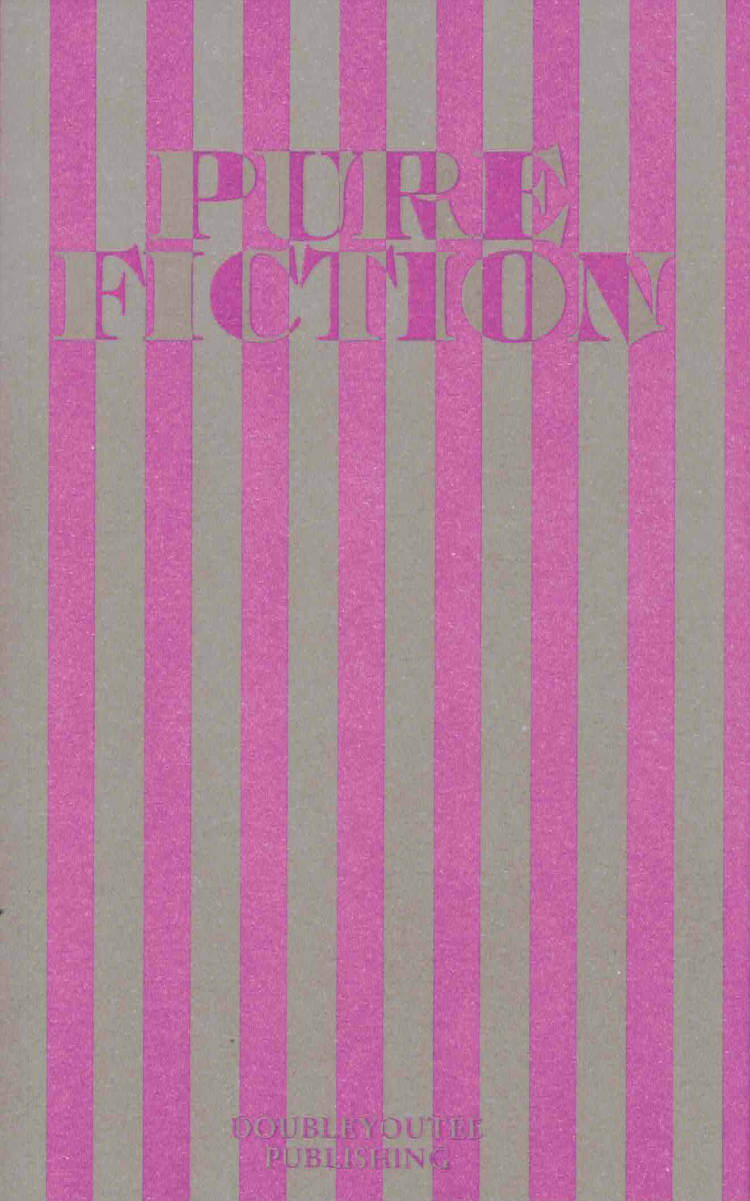
Pure Fiction
Pure fiction is a reader that examines how fiction-based writing and narrative building functions in contemporary artistic context.
Edited by Lisa Lagova and Manon Fraser with contributions by Susan Finlay, Manon Lutanie, Kristina Stallvik, Jonathan Blaschke, Nadia de Vries, Lisa Lagova, Ivan Cheng, Fadi Houmani, Nour Ben Saïd, Chris Kraus and Manon Fraser.
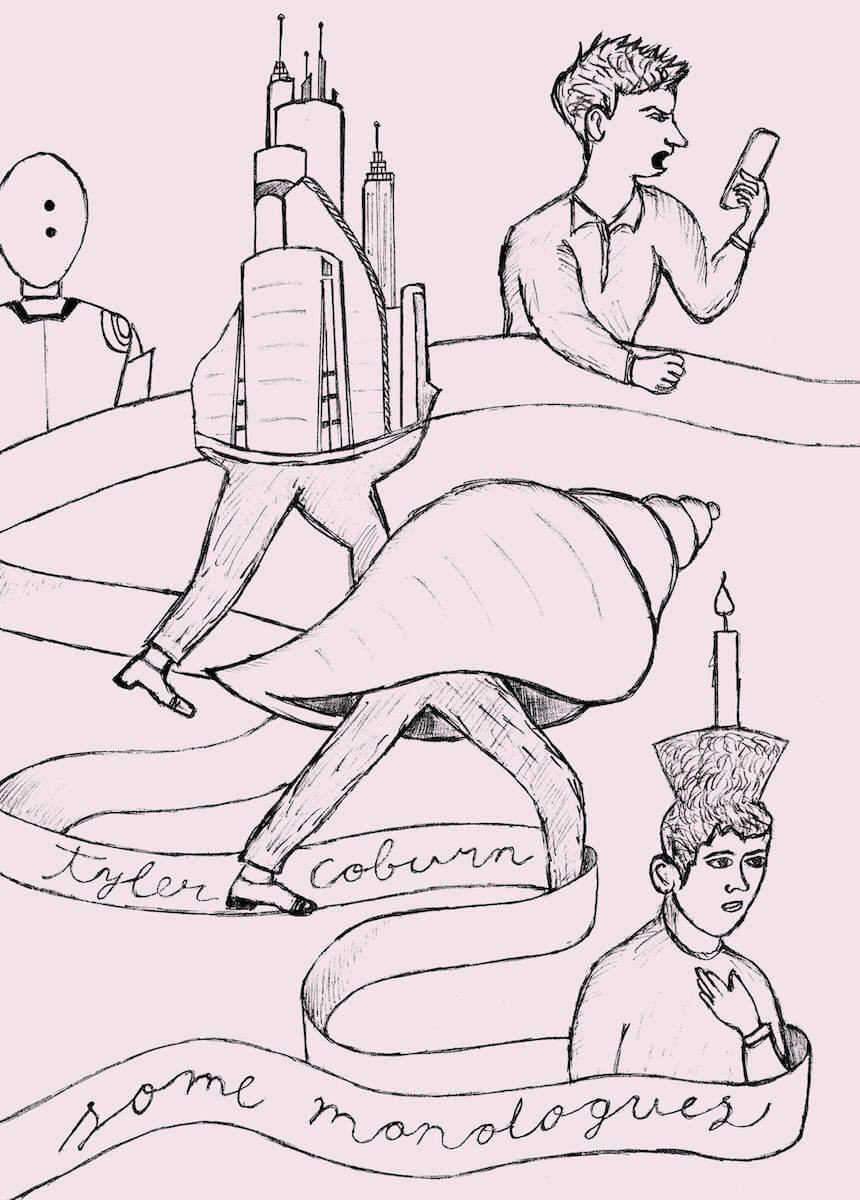
Some Monologues
Working at the nexus of performance, art writing, and fiction, Tyler Coburn creates monologues that explore how the “I” is marked in speech. His myriad topics—alternate history, legal personhood, digital labor, and resonant frequency, to name a few—defy straightforward modes of presentation, often insisting on site-specificity and social intimacy at the expense of conventional documentation.
Some Monologues collects, for the first time, the scripts of Coburn’s work from the past fifteen years, many of which have not previously been published. Accompanying them are texts by eleven artists, writers, curators, and scholars who experienced these performances firsthand, collaborated in their making, conversed with the artist about them, or share an interest in the subjects they engage. Written in theoretical, poetic, and autobiographical registers, these contributions offer new perspectives on the monologue as an expansive and relational form.
Introduction by Elvia Wilk. Contributions by Yu Araki, A.E. Benenson, Mashinka Firunts Hakopian, Sven Lütticken, Kameelah Janan Rasheed, Spyros Papapetros, Camille Richert, Théo Robine-Langlois, Ian Wallace, and Michelle Wun Ting Wong.
Tyler’s scripts refuse to fix an authorial voice; instead, they make the conditions of authorship itself their subject. Blurring the boundaries between fiction and document, the human and the bureaucratic, the self and its doubles, his work thinks through systems from the inside, often using language as both architecture and trap. In their precision and porousness, I recognize a shared pursuit: how to locate agency within constraint, and how to turn the administrative or the technological into a site of intimacy. — Jill Magid
In Tyler Coburn’s Some Monologues, a binary that remains constitutive for the ideological continuity of modern life, in all its colonial and capital forms, is undone: digital vs. physical. In troubling that chasm, Coburn plays out the repercussions of these ideologies of anthropomorphic naturalism, guiding us through their resonances, doubles, codings, and relays. But he also renders himself as the relay of these transferences, in the process expanding art’s premodern calling: to exist as an invocation. Reification suddenly appears as what is situated between embodiment and disembodiment, with both potentially destabilized. Some Monologues, the book, is this destabilization’s ideal format: as much documentation, an echo, of Coburn’s works through their scripts, as it is an instruction manual for denaturalizing our sense/s. — Kerstin Stakemeier
Tyler Coburn is an artist, writer, and professor based in New York. He received a 2024 Andy Warhol Foundation Arts Writers Grant, and his writing has appeared in ArtReview, BOMB, C Magazine, Dis, e-flux journal, frieze, LEAP, Metropolis M, Mousse, and Rhizome. Coburn is the author of four books: I’m that angel (self-published, 2012), Robots Building Robots (CCA Glasgow, 2013), Richard Roe (Sternberg, 2019), and Solitary (Sternberg and Art Sonje Center, 2022). He has presented artwork at such venues as Centre Pompidou, Paris; Bergen Kunsthall; Hayward Gallery, London; Para Site, Hong Kong; and Kunstverein Munich.
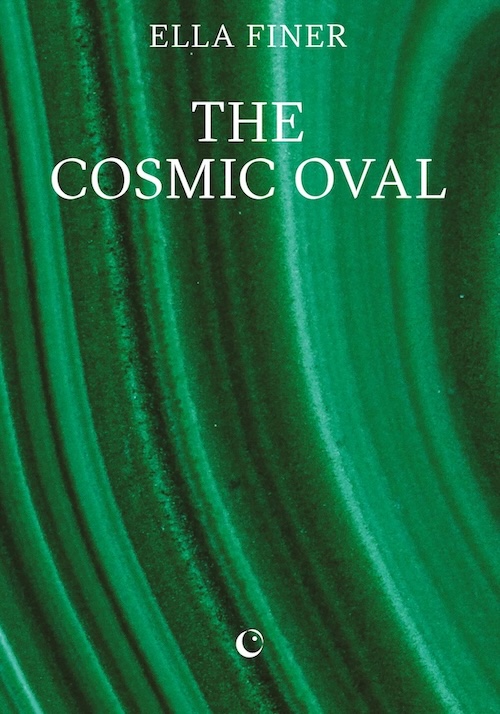
The Cosmic Oval
The Cosmic Oval is a nocturnal entrance into an exploration of feminist cosmologies, storytelling and the many ways of knowing and imagining the hot blue beginnings of time. By turn dreaming and waking, Ella Finer enters history and imagination from the sleep side, taking her cue from Anne Carson. Finer attends to cultural memory as composition, gathering cosmic guides with whom to listen beyond what is given to hear.
In west London, the entrance to architect and theorist Charles Jencks’ Cosmic House is overlooked by The Cosmic Oval, a representation of the origin of the universe referencing both contemporary scientific discoveries about its elliptical shape and ancient cosmogonic myths. Finer’s imagined conversation between the figures who inhabit the frieze surrounding the Oval, such as Hannah Arendt, Imhotep and John Donne, re-orchestrates cultural history to explore social scenes of study and the way knowledge moves through bodies and time.
Commissioned by the Jencks Foundation at The Cosmic House.
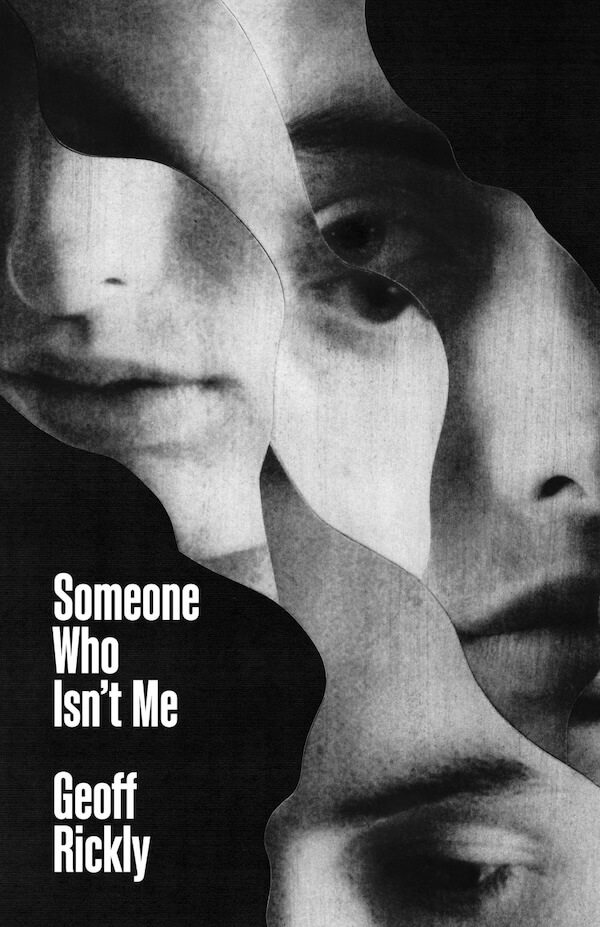
Someone Who Isn't Me
Geoff Rickly’s debut novel Someone Who Isn’t Me is a feverish journey through the psyche of someone who no longer recognizes himself.
When Geoff hears that a drug called ibogaine might be able to save him from his heroin addiction, he goes to a clinic in Mexico to confront the darkest and most destructive versions of himself. In this modern reimagining of the Divine Comedy, survival lurks in the darkest corners of Geoff’s brain, asking, will he make it? Can anyone?
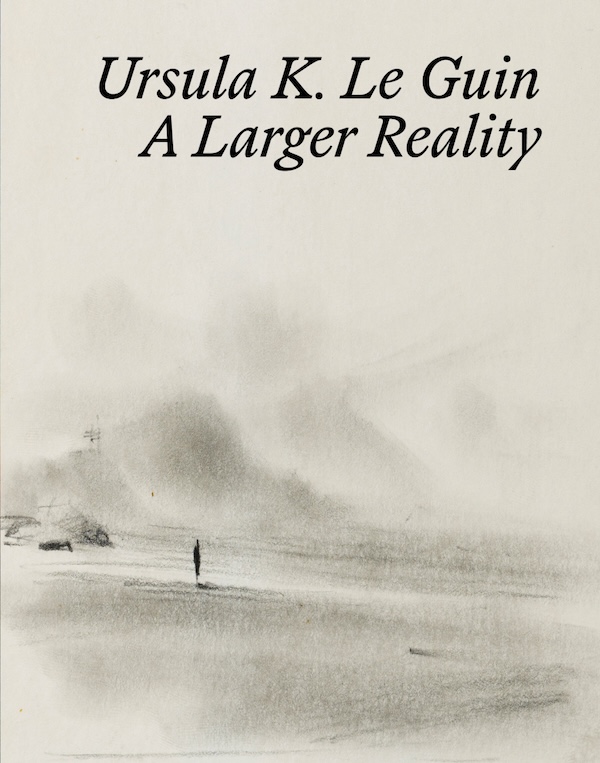
A Larger Reality
Ursula K. Le Guin, Conner Bouchard-Roberts
A beautiful compilation of poems, stories, essays, talks, and illustrations by Ursula K. Le Guin. Edited and designed by Conner Bouchard-Roberts.
With additional essays on Le Guin's thinking and craft by: adrienne maree brown, Isabelle Stengers, Moe Bowstern, Lola Milholland, Nisi Shawl, David Naimon, Mary Anne Mohanraj, Margaret Killjoy, Julie Phillips, and Harold Bloom.
This book serves as the companion publication to a gallery exhibition, of the same name, about Ursula’s life and work, showing at Oregon Contemporary Museum (from Nov 1st 2025 - Feb 8th 2026 in Portland, OR) curated by the Author’s son, Theo Downes-Le Guin.
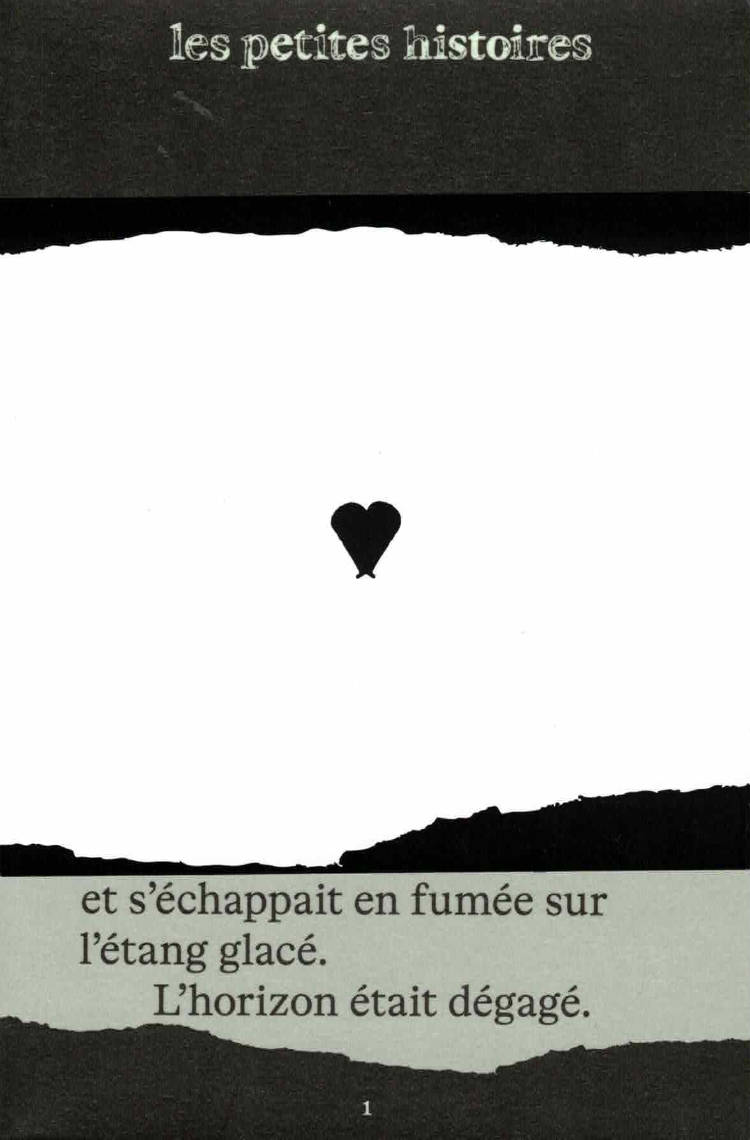
les petites histoires
Sam Buouffandeau, S. M. Drogo and 2 more
les petites histoires sont quatre courtes fictions contemporaines. Entre le lonely langoureux New York des années deux mille, le pont poétique et capricieux de Louis 2 de Bavière, l'histoire vraie de Sandy Stone dans les seventies et la satire cinglante et drôle d'une galerie d'art, ces livres sont de brefs univers vivants et curieux.
En 2025, quatre petites histoires sont racontées par quatre auteurices dans quatre livres : L'effondrement du pont de Sam Bouffandeau ; The Gallery de S. M. Drogo ; Exit de Juli Le Nahelec; «Que faire de Sandy Stone?» de Mia Trabalon.
L'édition des petites histoires a été imaginée par Élise Comte, Chloé Delchini, Perrine Estienne, Gabriel René Franjou, Justine Gensse, Bastien Hauser, et Cyprien Muth. Ce collectif d'éditeurices est né à Bruxelles, où les petites histoires ont été imprimées, chez Graphius.
La maquette, réalisée par Chloé Delchini, à été composée avec Otto, une typographie dessinée par Sam de Groot et Laura Opsomer Mironov, chez Dinamo Typefaces.
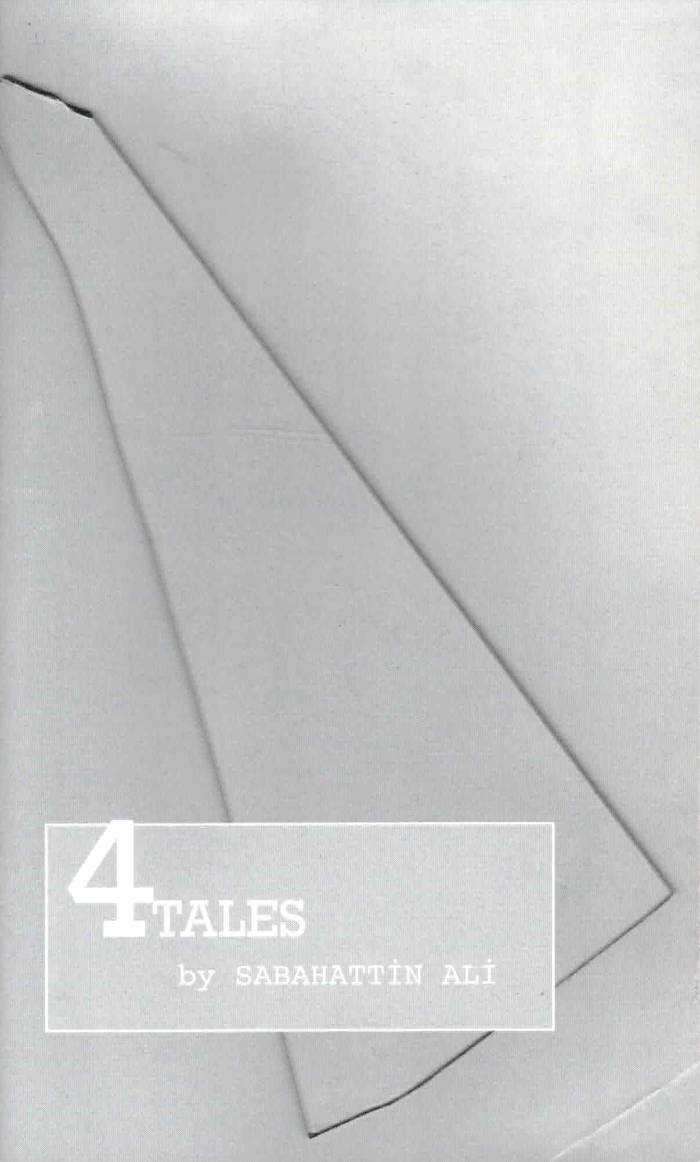
4 Tales
The power of Sabahattin Ali comes from beyond his words. It is his sense of observation, insight and commitment to fight for a fairer society that have carried his voice into the modern day.
The four tales in this book - Death of the Giants, A Tale of Love, A Tale of Sheep and The Glass Pavilion - were compiled and published in Sırça Köşk [The Glass Pavilion] in 1947. At the time Sabahattin Ali penned these tales, the young Turkish Republic was still struggling to establish a proper democracy with one sole party in parliament. In 1948 the Turkish Council of Ministers decided to ban Sırça Köşk, and all remaining copies were swiftly confiscated. Even after his death, the words of Sabahattin Ali were deemed as a governmental threat and for decades publishers were reluctant to print his work.
Almost eighty years later, these political and social tales remain just as poignant. Does this showcase Sabahattin Ali’s visionary spirit or a general lack of vision within our societies?
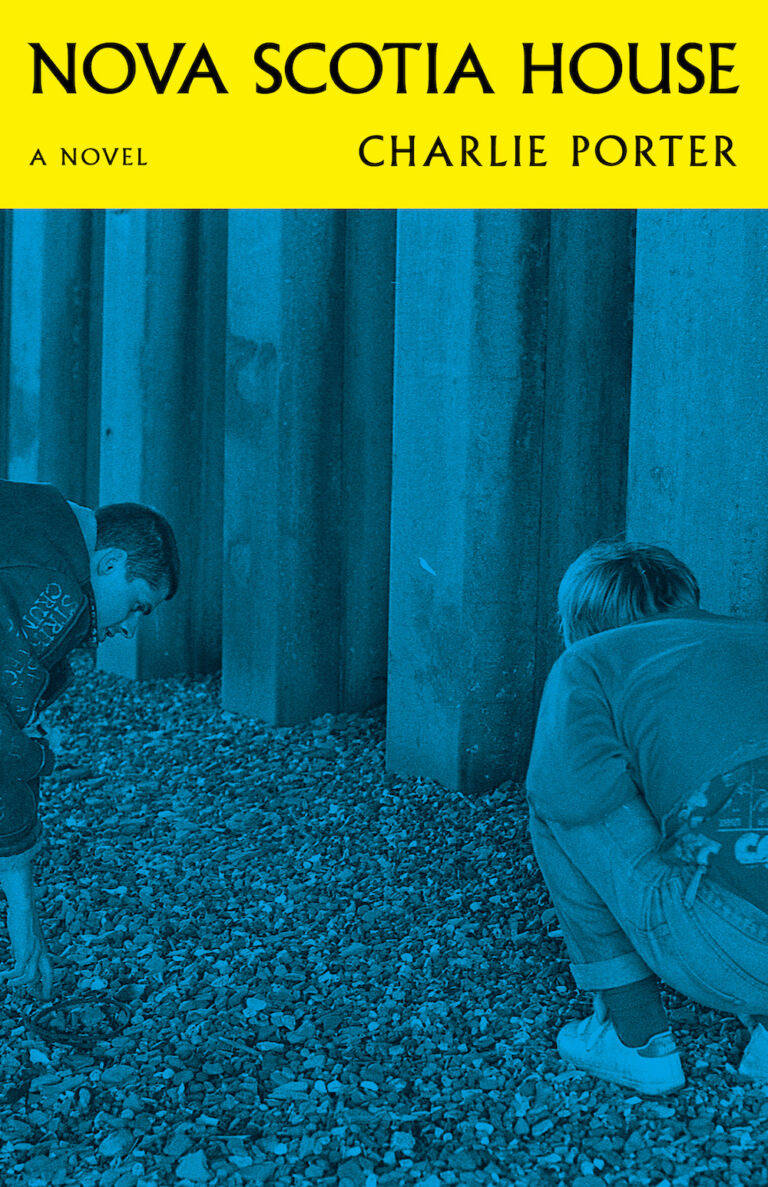
Nova Scotia House
Nova Scotia House takes us to the heart of a relationship, a community and an era, both a love story and a lament.
In this profound meditation on grief, Johnny looks back at his relationship with his life partner, Jerry, after his AIDS-related death. When they met, nearly thirty years ago, Johnny was 19, Jerry was 45. They made a life on their own terms in Jerry’s flat: 1, Nova Scotia House. Johnny is still there today—but Jerry is gone, and so is the world they knew.
Intimate, visionary, and profoundly original—as well as raw, hot, and hilarious—Nova Scotia House marks the debut of a vibrant new voice in contemporary fiction.
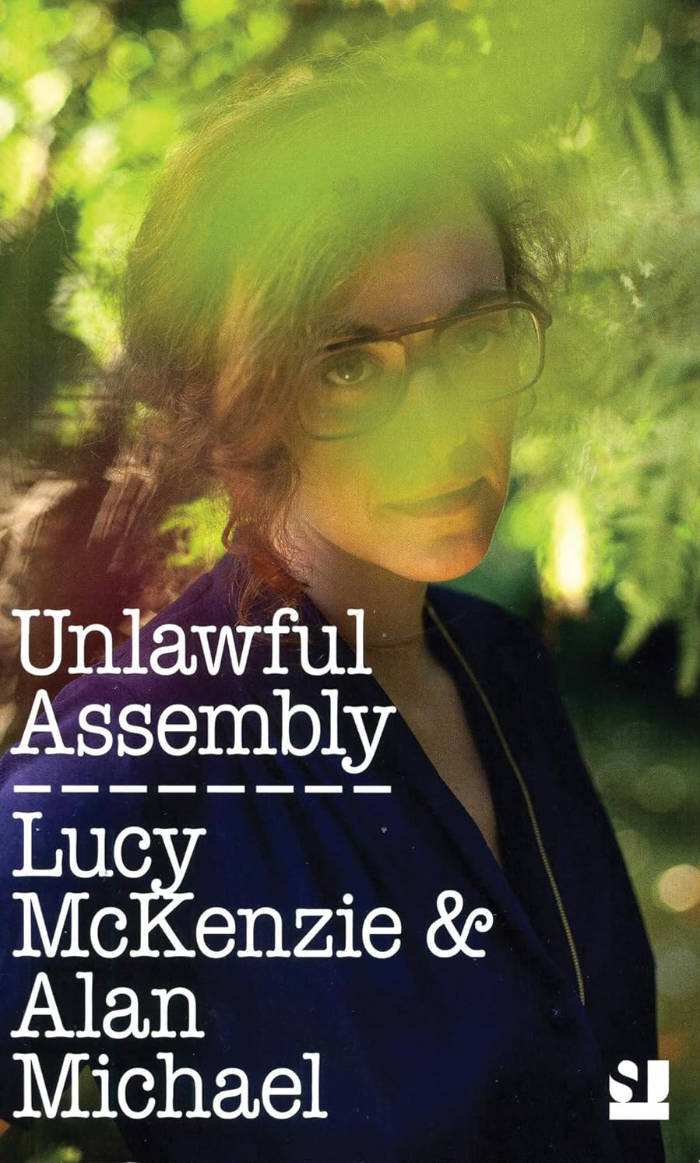
Verlag der Buchhandlung Walther König
Unlawful Assembly
A collection of interrelated short stories by Lucy McKenzie and Alan Michael. First published in private limited edition, it was intended as a cheap holiday read to titillate and entertain summer visitors to the Mediterranean island of Stromboli, and as a piece of site-specific work; the location of the action and the place in which it is read being the same.
The visual art subsequently generated by Unlawful Assembly includes work by Josephine Pryde, with whom the artists collaborated to produce this second edition’s cover image.
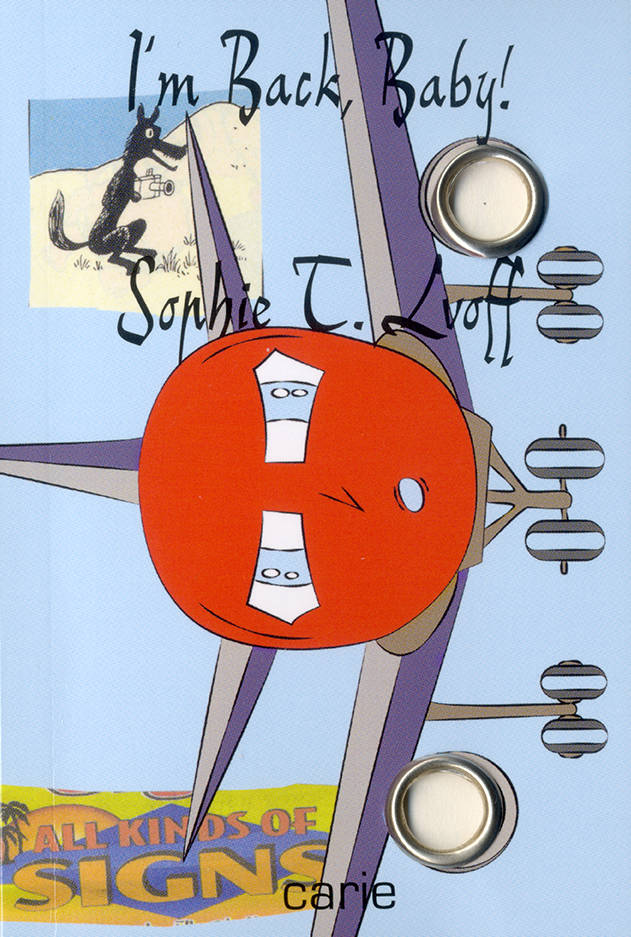
I'm Back, Baby!
Après la naissance de sa baby girl, Sophie T. Lvoff tente de faire son come-back dans l’art contemporain. Elle doit se rendre au vernissage de son exposition dans un Kunstverein en Allemagne. Juste avant, elle emmène ses étudiant·es à Sainte-Marie-de-la-Mer en Camargue pour prendre des photos de flamants roses et de couchers de soleil mais rien ne se passe comme prévu…
After the birth of her baby girl, Sophie T. Lvoff tries to make her comeback in contemporary art. Before heading to the opening of her exhibition at a Kunstverein in Germany, she takes her students to Sainte-Marie-de-la-Mer in the Camargue to photograph flamingos and sunsets, but nothing goes as planned…
A manicure would be a good thing to do for her international comeback, but perhaps that could happen in Munich later.
(I'm Back, Baby!)
Carie, comme le trou qu’on bouche au plomb, est une collection de textes courts et moyens qui se glissent dans la poche. Chaque livre (la dent) de la collection (la bouche) est troué (la carie) et cerclé d’un œillet métallique (le plombage).
Carie, like the hole filled with lead, is a collection of short and medium-length texts that slip into the pocket. Each book (the tooth) in the collection (the mouth) is holed (the cavity) and circled with a metal eyelet (the filling).
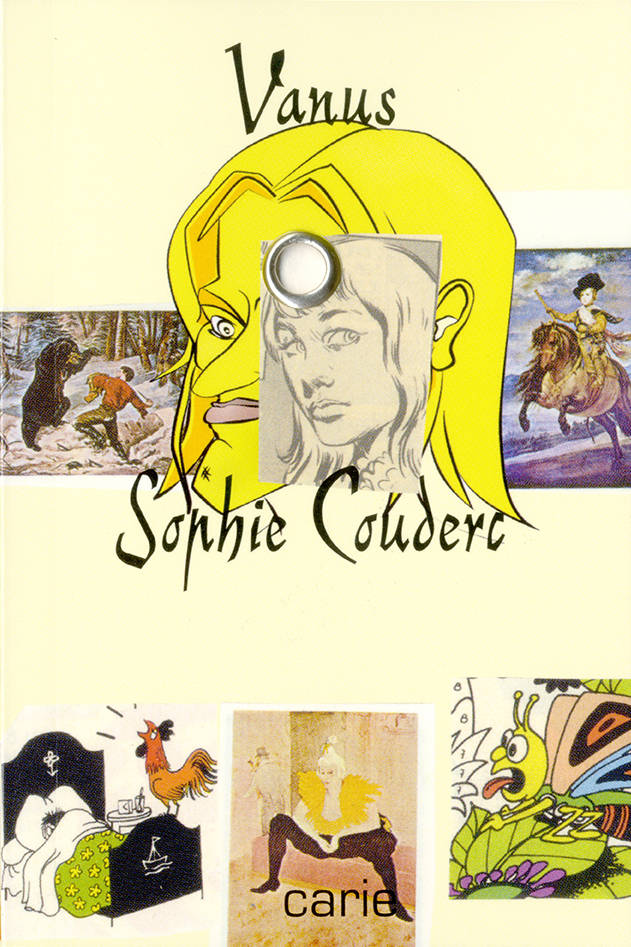
Vanus
Vanus übermann des villes, le roi de la ville, le roi du monde, se fait des odes à lui-même et met ses chaussettes dans la pâte à pain. Sophie Couderc raconte quelques-unes de ses péripéties.
Vanus übermann of the cities, the king of the city, the king of the world, writes odes to himself and puts his socks in bread dough. Sophie Couderc recounts some of his adventures.
Je jette le matelas dehors, il rebondit sur trois cons et tombe dans une grosse flaque de jus de rue. Ok, pas mal mais il m’en faut plus. (Vanus)
Carie, comme le trou qu’on bouche au plomb, est une collection de textes courts et moyens qui se glissent dans la poche. Chaque livre (la dent) de la collection (la bouche) est troué (la carie) et cerclé d’un œillet métallique (le plombage).
Carie, like the hole filled with lead, is a collection of short and medium-length texts that slip into the pocket. Each book (the tooth) in the collection (the mouth) is holed (the cavity) and circled with a metal eyelet (the filling).
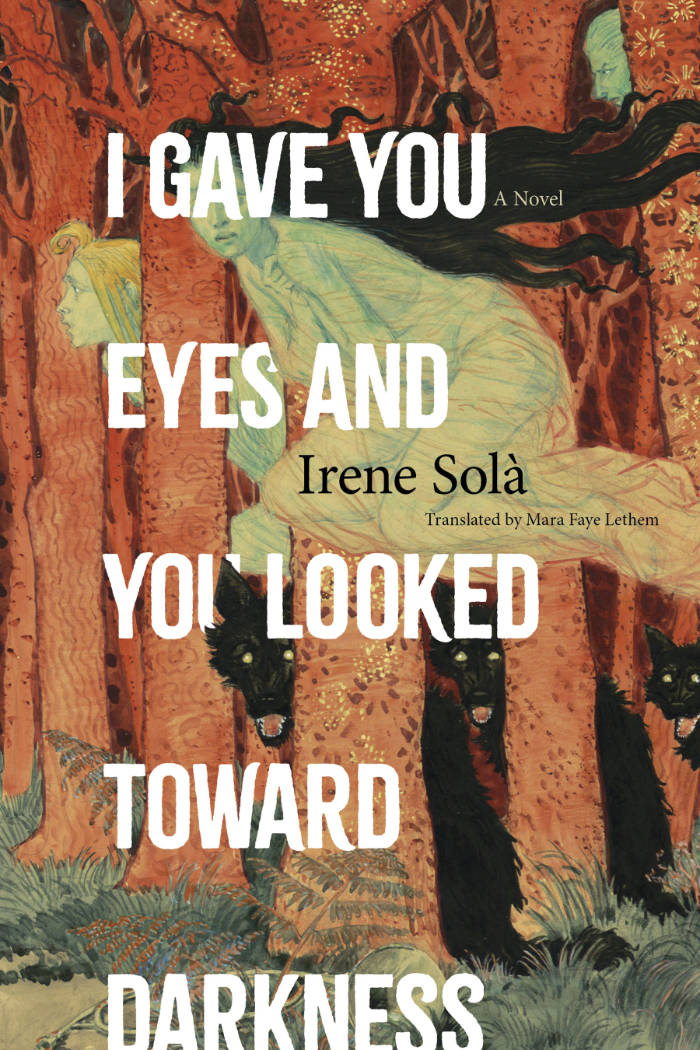
I Gave You Eyes and You Looked Toward Darkness
Dawn is breaking over the Guilleries, a rugged mountain range in Catalonia frequented by wolf hunters, brigands, deserters, race-car drivers, ghosts, and demons. In a remote farmhouse called Mas Clavell, an impossibly old woman lies on her deathbed. Family and caretakers drift in and out. Meanwhile, all the women who have lived and died in that house are waiting for her to join them. They are preparing to throw her a party.
As day turns to night, four hundred years’ worth of stories unspool, and the house reverberates with raucous laughter, pungent feasts, and piercing cries of pleasure and pain. It all begins with Joana, Mas Clavell’s matriarch, who once longed for a husband—“a full man,” perhaps even “an heir with a patch of land and a roof over his head.” She summoned the devil to fulfill her wish and struck a deal: a man in exchange for her soul. But when, on her wedding day, Joana discovered that her husband was missing a toe (eaten by wolves), she exploited a loophole in her agreement, heedless of what consequences might follow.
I Gave You Eyes and You Looked Toward Darkness is an audacious and entrancing novel in which the lines between the dead and the living, past and present, story and history are blurred. In it, Irene Solà draws on oral tradition as well as art, literature, and fairy tales to tell a completely new kind of story.

Across the Acheron
In her darkly funny 1985 take on Dante’s Divine Comedy, acclaimed French writer and activist Monique Wittig restages the journey through the circles of hell, limbo, paradise from a lesbian feminist perspective.
Never-before published in the US, Across the Acheron follows the adventures of “Wittig” and her anti-Virgilian guide through laundromats, billiard parlors, dyke bars, and picnic grounds of a 1980s San Francisco populated by hunters and their prey, lost souls, and fantastical beasts, including a robotic eagle and angelic bikers. Wittig reimagines Dante’s epic poem through a feminist and queer lens, subverting his cosmological order and upending gender identities and literary traditions. This edition brings the English translation of Wittig’s final novel back into print for the first time since the early-1990s, revised according to the author's notes, and with a new introduction by Sophie Lewis.
“Across the Acheron is a work of lesbian struggle and triumph across two kinds of hell. The hell of the classic western literary canon—and the hell of San Francisco. Monique Wittig brings all of her writerly powers and political experience to bear here, as witness to the horrors of heterosexual patriarchy and also to the possibility of another world for another life. Her work is a rare combination of deeply felt materialism and radical linguistic freedom. If we're to have another world, we'll need to create another language. She knew that, and she lived it.” — McKenzie Wark
“Even in fiction Monique Wittig’s writing is critical, prescient, brilliant, satirical, searing, and way ahead of its time. I’m so glad this work is back in circulation to revisit and revel in.” — Pamela Sneed
“In this unendurable yet compelling journey through the circles of patriarchal hell, Wittig encounters hordes of tortured women who do not struggle against their oppressors. Their brainwashing is as difficult to witness as their bloodied flesh. Only through communal activism does the seeker’s soul becomes tough enough to enter Paradise, where bare-breasted angels dismount motorcycles and offer baskets of 'cherries, strawberries, raspberries, apricots, peaches, plums, tomatoes, avocados, green melons, cantaloupes, watermelons, lemons, pawpaws, pineapples and coconuts.’ The bounties of Across the Acheron are lush and many.” — Dodie Bellamy
“A Guernica of the human (feminist) condition, a blacker, bleaker, more vengeful Alice’s tea party, this is a novel as graphic as a painting, whose brilliance its translators have creditably preserved.” — Publishers Weekly
Introduction by Sophie Lewis
Translated by David Le Vay with Margaret Crosland

The Lesbian Body
In this genre- and gender-breaking work of theory-fiction, legendary writer and cofounder of the 1970s French feminist movement Monique Wittig celebrates the body—lesbian, literary and defiantly political—and challenges the order of heterosexuality in literature.
First published in French in 1973, The Lesbian Body mines the relationship between a lover and a beloved—also a writer and a text—to explore the ideological and historical constructions of the female subject. Organized according to the principle of montage, poetic passages are juxtaposed with anatomic lists that mark lesbian eros. Through expressions of joy, violence, and tenderness, the site of pleasure is celebrated. In her transfiguration of gender and its paradigms, Wittig transformed French vocabulary, feminizing grammar and lesbianizing myths. This edition brings the English translation of Wittig’s groundbreaking work back into circulation for the first time since the mid-1980s, revised according to the author's notes, and with an introduction by Paul B. Preciado.
“The Lesbian Body is a fundamental work of lesbian existence. Wittig's applied vision is a state of natural delirium, a revolutionary excess of utopianism, refusal, and mutual self-creation. Revisiting it reveals how much passionate free thought has been lost, and simultaneously, how many of her tropes and discoveries have integrated into our collective consciousness.” — Sarah Schulman
“In this stunning new rendering of The Lesbian Body by the French author, theorist, activist and teacher, the late Monique Wittig, we are plunged into an imagined world of passionate violence and erotic lesbian mayhem intertwined in strikingly bold poetic images. Wittig, in the reach and volatility of her imagination, stands alongside such important American writers as Audre Lorde, Adrienne Rich, and Valerie Solanas, all of whose work deserves to be read again, or for the first time.” — Esther Newton
“To read the book is to be forced by Wittig into another grammar and happily contaminated by its strange forms. You will never think straight again.” — Jack Halberstam
“For me, Wittig opened up a sense of the world that had been, quite literally, unimaginable. She tore us apart.” — Judith Butler
“Together with Ursula Le Guin and Samuel R. Delany, Wittig is the first to design a nonbinary utopia, a world in which the binary categorization of sexes and genders will have ceased to exist.” — Paul B. Preciado
Introduction by Paul B. Preciado
Translated by David Le Vay
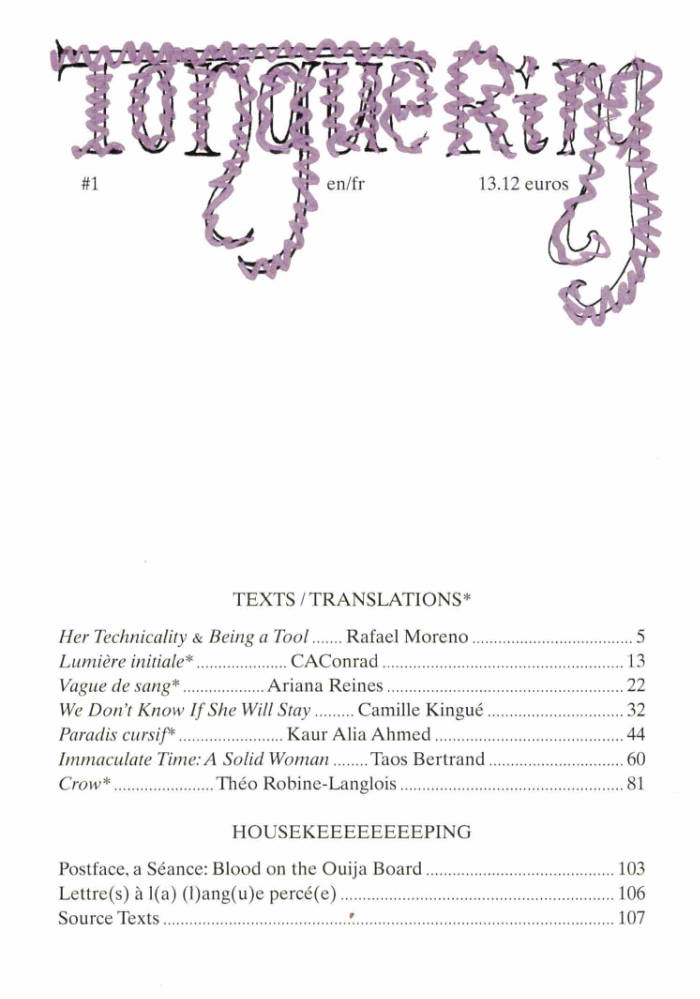
Tongue Ring: Issue 01
Aodhan Madden, Claire Star Finch
Oh oh this is the first issue of Tongue Ring, a journal of experimental writing in English & French, with original contributions and translations of texts* by Ariana Reines*, CAConrad*, Camille Kingué, Kaur Alia Ahmed*, Rafael Moreno, Taos Bertrand, and Théo Robine-Langlois*.
Vous voyez, c’est ça mon genre. Je ne sais pas ce que c’est.
Mais c’est mon genre. J’ai cet esprit en moi—qui est très ému
par la féminité. Je pourrais me mettre à pleurer. Je veux poser
mon manteau par terre pour la laisser marcher dessus
—Ariana Reines
Premier numéro de la nouvelle revue fantastique et bilingue (FR + EN) d’écriture expérimentale Tongue Ring, avec des contributions originales ainsi que des traductions* de textes de Ariana Reines*, CAConrad*, Camille Kingué, Kaur Alia Ahmed*, Rafael Moreno, Taos Bertrand, and Théo Robine-Langlois*.